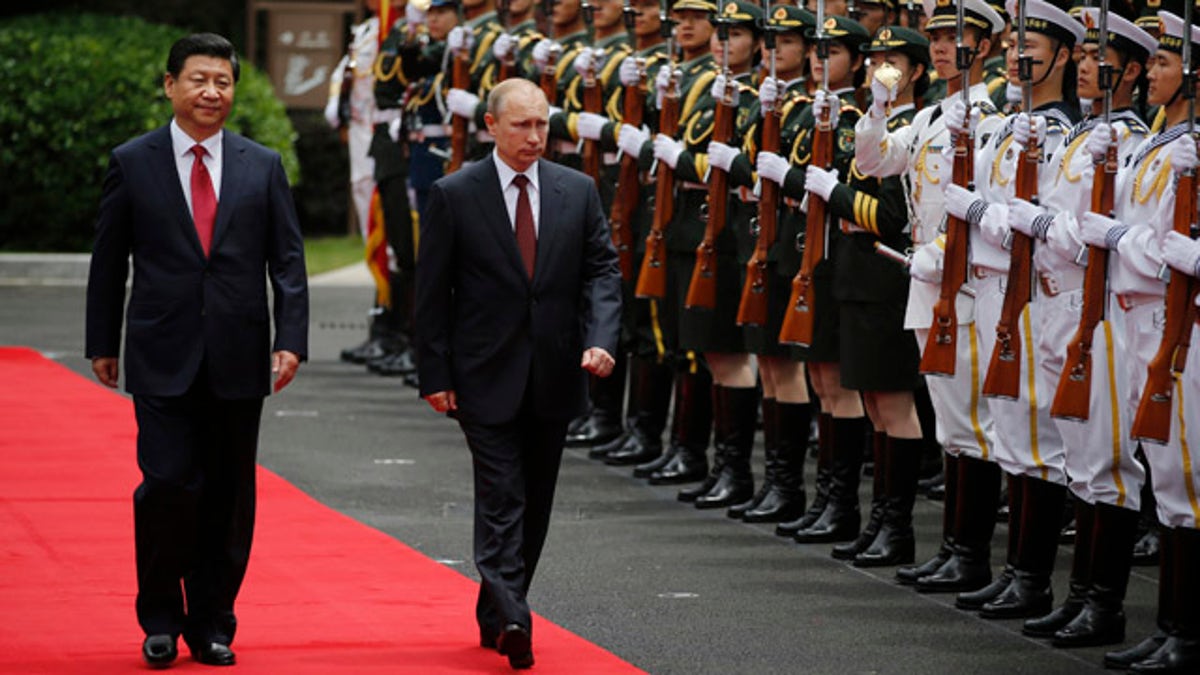
May 20, 2014: Russia's President Vladimir Putin, center, and China's President Xi Jinping, left, review an honor guard during a welcoming ceremony at the Xijiao State Guesthouse ahead of the fourth Conference on Interaction and Confidence Building Measures in Asia (CICA) summit in Shanghai. (AP Photo/Carlos Barria, Pool)
SHANGHAI – President Vladimir Putin met Tuesday with China's president in a diplomatic boost for the isolated Russian leader but his spokesman said the two sides had yet to agree on a widely anticipated multibillion-dollar natural gas sale.
Putin, shunned by the West over Ukraine, met with Chinese President Xi Jinping at a start of a two-day meeting on Asian security with leaders from Iran and Central Asia. The Russian leader is hoping to extend his country's dealings with Asia and diversify markets for its gas, which now goes mostly to Europe.
Russia and China have been negotiating a proposed 30-year gas supply deal for more than a decade, and officials said they hoped to complete work in time to sign a contract while Putin is in Shanghai. But Putin's spokesman, Dmitry Peskov, said Tuesday it wasn't finalized.
"Significant progress has been reached on gas, but there are issues that need to be finalized regarding the price," Peskov said, according to Russian news agencies. He said a contract could be signed "at any moment."
A deal would give Moscow an economic and political boost at a time of Western sanctions, while pressure on Moscow is thought to give Beijing leverage to push for a lower price.
The U.S. treasury secretary, Jacob Lew, appealed to China during a visit last week to avoid taking steps that might offset sanctions. However, American officials have acknowledged China's pressing need for energy.
Putin and Xi attended the signing of 49 cooperation deals in fields including energy, transport and infrastructure, but no details were given at the ceremony.
The price of gas is the sticking point in the proposed agreement between Russia's government-controlled Gazprom and state-owned China National Petroleum Corp.
A deal has looked increasingly likely after Washington and the European Union imposed asset freezes and visa bans on dozens of Russian officials and several companies.
The deal to pipe Siberian gas to China's northeast would help Russia diversify export routes away from Europe. It would help to ease Chinese gas shortages and heavy reliance on coal.
Putin told Chinese reporters ahead of his visit that China-Russia cooperation had reached an all-time high.
"China is our reliable friend. To expand cooperation with China is undoubtedly Russia's diplomatic priority," Putin said, according to the official Xinhua News Agency.
Xi and Putin were scheduled to kick off a joint exercise between their two navies in the northern part of the East China Sea.
The two countries developed a strategic partnership after the 1991 Soviet collapse, including close political, economic and military ties in a shared aspiration to counter U.S. influence, especially in Central Asia.
A tentative agreement signed in March 2013 calls for Gazprom to deliver 38 billion cubic meters of gas per year beginning in 2018, with an option to increase that to 60 billion cubic meters.
Plans call for building a pipeline to link China's northeast to a line that carries gas from western Siberia to the Pacific port of Vladivostok.
A gas deal would mean China would be in a "de facto alliance with Russia," said Vasily Kashin, a China expert at the Center for Analysis of Strategies and Technologies in Moscow.
In exchange, Moscow might lift restrictions on Chinese investment in Russia and on exports of military technology, Kashin said in an email.
"In the more distant future, full military alliance cannot be excluded," Kashin said.
"It will, however, take years for China to start playing in the Russian economy a role comparable to that of the EU," he said. "After that happens, both China and Russia will be much less vulnerable to any potential Western pressure and that, of course, will affect the foreign policy of both these countries."




















